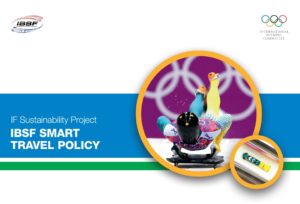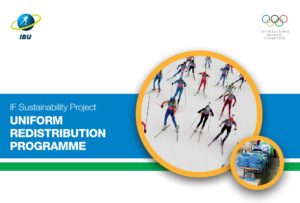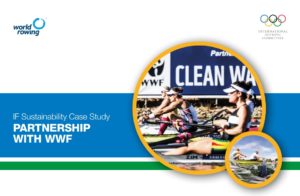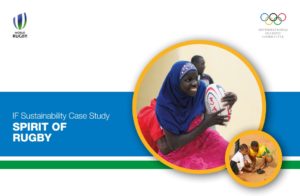
The International Bobsleigh & Skeleton Federation (IBSF) regularised a number of new policies relating to travel and transportation within the federation. The policies were created as a strategic response to the high travel costs that had been observed in the 2010 annual financial report. Previously, the more than 90 jury staff assigned to competitions, the IBSF Executive Board and the IBSF staff members could organise their own travel to competitions and other events, and then be reimbursed by the IBSF. The new approach centralises all travel arrangements, with a specific employee dedicating part of her time to arranging transportation in the most efficient and sustainable way possible.


Since 2008, the International Biathlon Union (IBU) has received approximately 100 competition packages every two years for its international referees and technical delegates through its partnerships with suppliers. The uniform packages include boots, winter jackets, tops, trousers and raincoats, ensuring officials are correctly clothed for the winter weather conditions during competition and are easily recognisable as IBU officials. When new sets of uniforms are dispatched, the IBU asks officials to return their previous sets. This request is designed to ensure that there is no confusion regarding which set is currently valid for use. Approximately 80 of these used uniforms are then sent to a local partner company for repairs and to remove the IBU officials logo, at a total cost every two years of approximately €12,000.



The International Fistball Association (IFA) and the World Flying Disc Federation (WFDF) aim to place sustainable development at the core of their organisations to create positive economic, social and environmental impacts through their operations and events. The limited resources of both International Federations (IFs) encouraged them to collaborate, sharing information and resources on different topics including sustainability. As a result, they have been able to provide a higher level of support to their National Federations (NFs) and Local Organising Committees (LOCs).





When planning its new World Archery Excellence Centre in Lausanne, Switzerland, World Archery resolved to create a building that was sustainable and had positive impacts on both the sport of archery and the local community. Through an agreement with the city of Lausanne, World Archery received the land in exchange for providing electricity to the city through its solar panels








World Archery has cut back on the use of plastic bottles at competitions, reducing waste and saving money. One million plastic bottles are bought around the world every minute – and this number is forecast to jump another 20 per cent by 2021, according to the Guardian/ Euromonitor. This volume of plastic is contributing to an environmental crisis some campaigners predict will be as serious as climate change, posing significant threats to our health, our oceans and our wildlife




Fresh water accounts for less than one per cent of the world’s water bodies, and one billion people currently have no access to safe drinking water. Recognising the vital global importance of clean fresh water, the World Rowing Federation (FISA) and WWF joined forces in 2011 to address this key issue in sustainable development, a crucial element for the sport of rowing and the well-being of its athletes. World Rowing believes it has a responsibility to not only apply environmentally sustainable practices, but also to take a lead in this global issue. Through the partnership, World Rowing has been able to educate rowing communities and the public about the value of clean water.




World Rugby recognises the power of sport as a catalyst for social development and a tool to improve people’s lives. To harness this spirit and engage with the wider rugby family, World Rugby developed “Spirit of Rugby” in 2016. As part of this programme, World Rugby invited organisations to submit proposals for joint sustainability-related projects, providing them with an opportunity to partner with the International Federation (IF) and leverage the “Spirit of Rugby” initiative’s visibility and energy.









World Sailing has placed sustainability at the heart of the organisation. Following the publication in November 2016 of the first World Sailing Sustainability Strategy (2017-2030), which evolved through internal research and a stakeholder consultation process, World Sailing hired a dedicated sustainability expert in June 2017.




In the words of the United Nations: “While the world has achieved progress towards gender equality and women’s empowerment, women and girls continue to suffer discrimination in every part of the world. ”Building on its ongoing efforts to promote and respect gender equality, World Taekwondo (WT) has developed and implemented a strategy designed to guarantee that half of all referees officiating at WT-sanctioned events are women – representing a substantial step towards gender equality.



More than ten years ago, the International Boxing Federation (AIBA) established a redistribution policy for the sport equipment it acquires for its annual major events. For each event, AIBA secures sponsorship partners that provide the necessary equipment, such as boxing rings, boxing gloves, head guards, pads and punching bags. Within the framework of the sponsor agreement is the understanding that all equipment used for the event will be donated to the host National Federation (NF). The NF then has the responsibility of redistributing the equipment to local clubs and development centres in order to help athletes who require proper equipment for training and competition.

